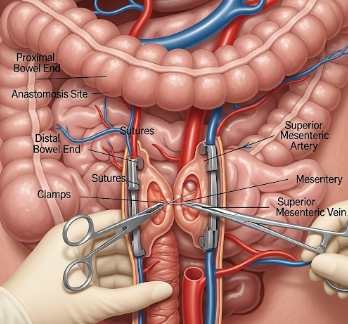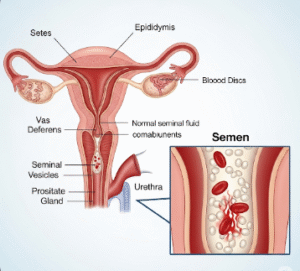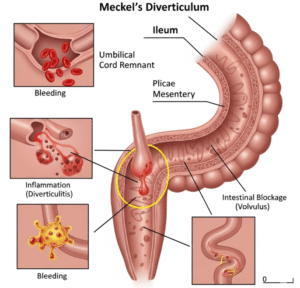Overview
Ostomy reversal surgery is a procedure to restore normal bowel continuity after a temporary ileostomy or colostomy. Patients who previously underwent an ostomy for conditions like inflammatory bowel disease, colorectal cancer, or bowel obstruction may be eligible for reversal once the underlying condition has healed.
South Korea is renowned for advanced gastrointestinal surgery, minimally invasive techniques, and expert post-operative care, making it a preferred destination for patients seeking safe, effective ostomy reversal with optimal recovery.
What is an Ileostomy & Colostomy Reversal?
Ostomy reversal involves:
- Surgically reconnecting the intestine to restore normal bowel function
- Closing the stoma and repairing the abdominal wall
- Performed via open or laparoscopic surgery depending on patient anatomy and surgical complexity
- Temporary ostomies (ileostomy or colostomy) are usually reversible, whereas permanent ostomies are not
Indications include:
- Resolution of underlying bowel disease
- No active infection or inflammation
- Sufficient healing time after initial surgery
- Patient medically fit for surgery
What are the Benefits?
- Restores normal bowel function → Eliminates need for external stoma pouch
- Improves quality of life → Physical comfort and psychological well-being
- Cosmetic improvement → No visible stoma
- Minimally invasive techniques → Smaller incisions, less post-operative pain, faster recovery
- Expert care in Korea → High success rates and low complication rates
- Ongoing support → Diet, physiotherapy, and stoma care education for smooth transition
Procedure Details
1) How should I prepare for an Ostomy Reversal?
- Preoperative evaluation → Blood tests, imaging, colonoscopy, and assessment of stoma and surrounding tissues
- Bowel preparation → Cleansing regimen as advised by surgeon
- Medication review → Blood thinners and certain chronic medications may need temporary adjustment
- Lifestyle adjustments → Maintain hydration, stop smoking, and follow dietary recommendations
- Preoperative consultation → Discuss surgical approach (open vs laparoscopic), expected recovery, and post-operative care
2) What happens during the Ostomy Reversal procedure?
- Anesthesia → General anesthesia
- Surgical steps →
- Incision around stoma or laparoscopic ports placed for minimally invasive surgery
- Disconnect the stoma appliance and mobilize the intestine
- Reconnect the small or large intestine using sutures or staplers
- Close the abdominal wall and skin incision
- Duration → 1–3 hours depending on complexity and adhesions from previous surgery
- Monitoring → Vital signs, fluid balance, and anesthesia closely monitored
3) What happens after Ostomy Reversal?
- Immediate recovery → Patient monitored for vital signs, bowel function, and wound healing
- Hospital stay → Usually 5–10 days depending on patient health and surgical approach
- Pain management → Oral or IV analgesics; minimally invasive surgery reduces post-operative pain
- Activity restrictions → Avoid heavy lifting, strenuous exercise, or sexual activity for 4–6 weeks
- Dietary adjustments → Gradual reintroduction of fiber-rich foods; monitor tolerance and bowel output
- Follow-up visits → Assess wound healing, bowel function, and overall recovery
Risks / Benefits
Risks
- ➤ Infection at surgical site or intra-abdominal infection
- ➤ Bleeding or hematoma formation
- ➤ Anastomotic leak (rare but serious complication where bowel connection fails)
- ➤ Adhesions or bowel obstruction
- ➤ Temporary bowel irregularities (diarrhea, constipation, cramping)
- ➤ Delayed recovery in patients with previous complex surgeries
Benefits
- ➤ Restores normal bowel continuity and function
- ➤ Improves physical comfort and psychological well-being
- ➤ Minimally invasive options reduce recovery time
- ➤ High success rate in Korea with expert colorectal surgeons
- ➤ Reduces long-term complications associated with permanent stoma
Recovery and Outlook
- Immediate recovery → Mild abdominal pain, bloating, or irregular bowel movements for a few days
- Hospital stay → 5–10 days depending on surgical approach and patient condition
- Return to normal activity → Light activities after 2–3 weeks; full recovery in 6–8 weeks
- Long-term outlook → Most patients achieve complete restoration of bowel function and independence from ostomy appliances
- Post-operative care → Wound care, gradual diet adjustments, and monitoring for bowel function
- Lifestyle adjustments → Nutrition management, hydration, and follow-up consultations for smooth recovery
South Korea provides comprehensive post-operative care, including dietary guidance, physiotherapy, and counseling to ensure patients adapt smoothly after ostomy reversal.
When To Call the Doctor
Contact your surgeon immediately if you notice:
- ⚠️ Severe abdominal pain or swelling
- ⚠️ Fever, chills, or signs of infection
- ⚠️ Persistent diarrhea, constipation, or inability to pass gas
- ⚠️ Abdominal distension or vomiting
- ⚠️ Wound discharge, redness, or separation
- ⚠️ Emotional distress affecting daily function
Best Korea Option / Process
South Korea is a leading destination for ileostomy and colostomy reversal due to:
- Expert colorectal and gastrointestinal surgeons specializing in minimally invasive reversal techniques
- Advanced laparoscopic and robotic-assisted surgical technology
- Comprehensive post-operative care, including dietary, physiotherapy, and psychological support
- High success rates and low complication rates
- International patient services → Coordination, translation, and follow-up guidance
Top Hospitals for Ostomy Reversal in Korea:
- Asan Medical Center, Seoul – Advanced minimally invasive colorectal surgery and rehabilitation
- Samsung Medical Center – Expertise in complex ostomy reversal with rapid recovery programs
- Seoul National University Hospital (SNUH) – Comprehensive post-operative support and follow-up
- Yonsei Severance Hospital – Multidisciplinary care for optimal surgical outcomes
👉 For patients who previously had an ostomy, reversal surgery in Korea offers safe, effective restoration of bowel continuity with expert care, minimally invasive techniques, and comprehensive post-operative support.













